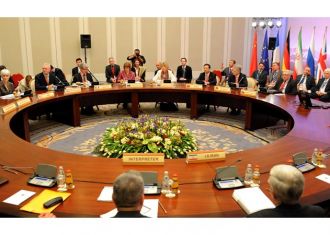ID :
293423
Thu, 07/18/2013 - 11:00
Auther :
Shortlink :
https://www.oananews.org//node/293423
The shortlink copeid
5+1 group keen to resume Iran talks

TEHRAN,July 18(MNA) – The members of the 5+1 group have expressed hope that the negotiations with Iran over its nuclear program can resume "as soon as possible" but have set no date for any new talks.
On Tuesday, senior diplomats from the six countries negotiating with Tehran - the United States, Russia, China, France, Britain, and Germany - met in Brussels to map out plans for diplomacy following the June 14 presidential election in Iran, Reuters reported.
Negotiations have been on hold since a round of talks in April and the six nations are keen to get back to the table.
European Union foreign policy chief Catherine Ashton, who oversees talks with Iran on behalf of the six powers, said they were waiting for Tehran to nominate a team of negotiators after the presidential vote, before making concrete plans.
"We very much hope that will be soon, and we look forward to meeting with them as soon as possible," she said in a statement after the meeting.
The election of a relative moderate, Hassan Rohani, on June 14 has raised some hopes for a resolution of the long-running dispute over Iran's nuclear program.
The six powers have demanded that Tehran abandon 20 percent uranium enrichment. Tehran says it needs atomic power for energy generation and medical research.
Other than a suspension of enrichment of uranium to 20 percent fissile purity, the six powers have asked Iran to ship out the existing stockpile of the material and close down a facility where such work is done.
Rohani, who takes office in August, has pledged a less confrontational approach than his predecessor, Mahmoud Ahmadinejad, under whose presidency over the last eight years, Iran has faced increasingly tough international sanctions.
One Western diplomat said a new round of talks would likely take place between late August and early October, and would be seen as an opportunity to hear the Iranian side after the election. It would be unlikely a deal could be reached then.
"The first round will be warm-up, to see Rohani's position," said the diplomat, who spoke on condition of anonymity but has close knowledge of the talks.
So far, Western diplomats have said the next move in diplomacy belonged to Iran, urging it to accept an offer of moderate sanctions relief in exchange for curbs to its nuclear work, extended in Kazakhstan earlier this year.
But nuclear experts have said the West may have to refine its strategy to help Rohani strike a deal.
A former senior U.S. administration official said last week it was not yet known whether Rohani's election would improve the prospects for a nuclear deal, but that Washington and its allies would need to move quickly if they were to take advantage of whatever opportunity may exist after the vote.
"There will be a natural tendency within the administration to stand pat for now and wait to see whether the new Iranian government will alter its approach when talks resume," Robert Einhorn, the U.S. State Department's non proliferation adviser until last May, wrote in a July 10 Foreign Policy article.
"The United States needs to do everything it can in the weeks and months ahead to prepare itself for any promising opportunity that presents itself when talks resume," he wrote.





